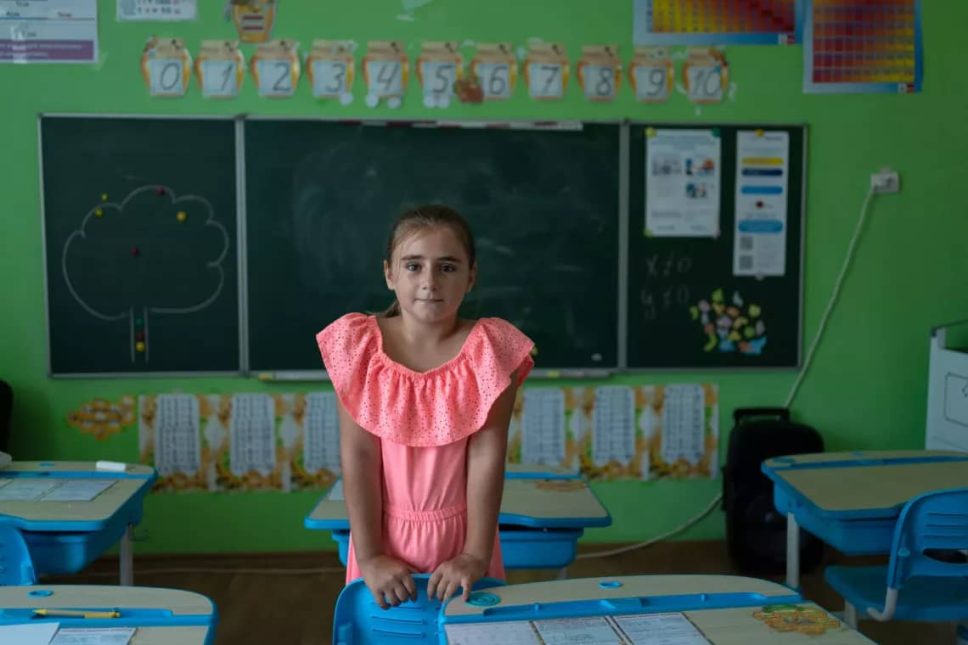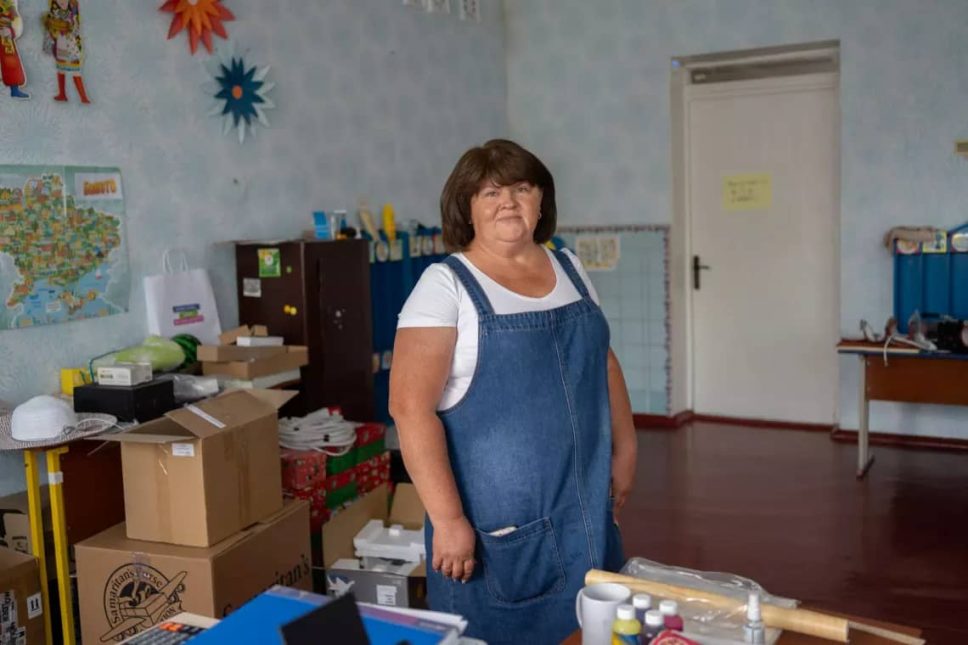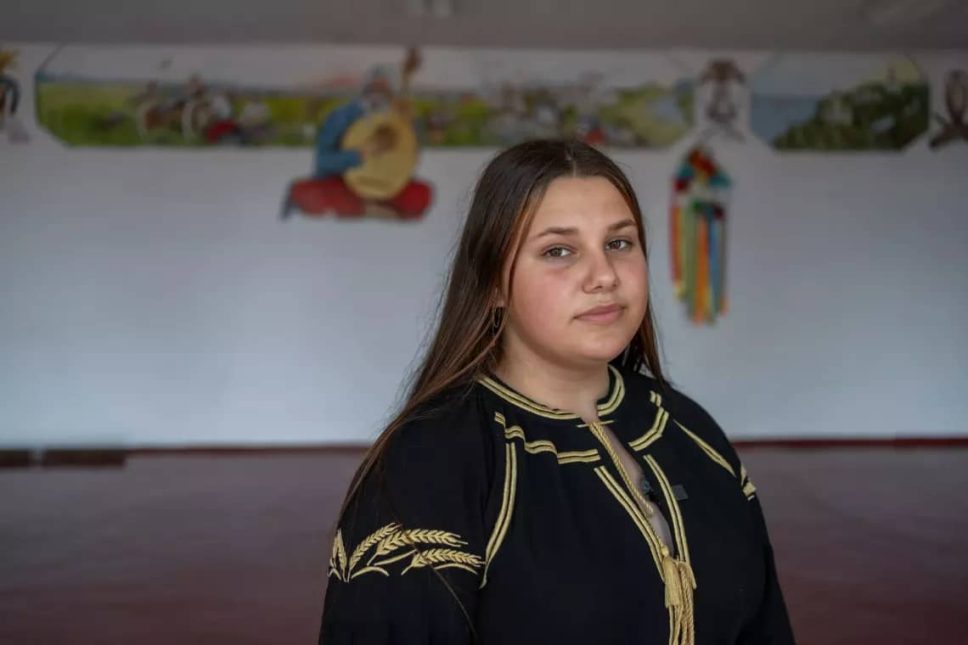
After years of upheaval, Ukrainian children catch up with classes
30/08/2024
Eight-year-old Alyona stands on tiptoe next to a large photograph of her class, displayed on the wall of her classroom.
“This is my friend,” she exclaims, pointing to the picture. “And this is my friend.”
The youngster does not stop until she has named all 11 students in her class, many of whom she met for the first time last winter when her lyceum transitioned from online learning to a trial mixed format, after one and a half years of only studying online due to the ongoing war in Ukraine. This finally allowed her to meet her classmates and teachers face to face.
“When I was in kindergarten, the coronavirus started. And when I was in first grade, the war broke out.”
Alyona, who lives in eastern Ukraine
Now, at last, she is once again able to attend classes and visit her favourite library to borrow books during the summer holidays.
“I hope that fear won’t stop our learning”
Alyona spent her entire first grade and part of the second grade studying online, which means she has never experienced the excitement of a traditional first bell ceremony.
“I hope that fear won’t stop our learning in the new school year,” she says. “I want to have a festive ceremony without fear interfering.”
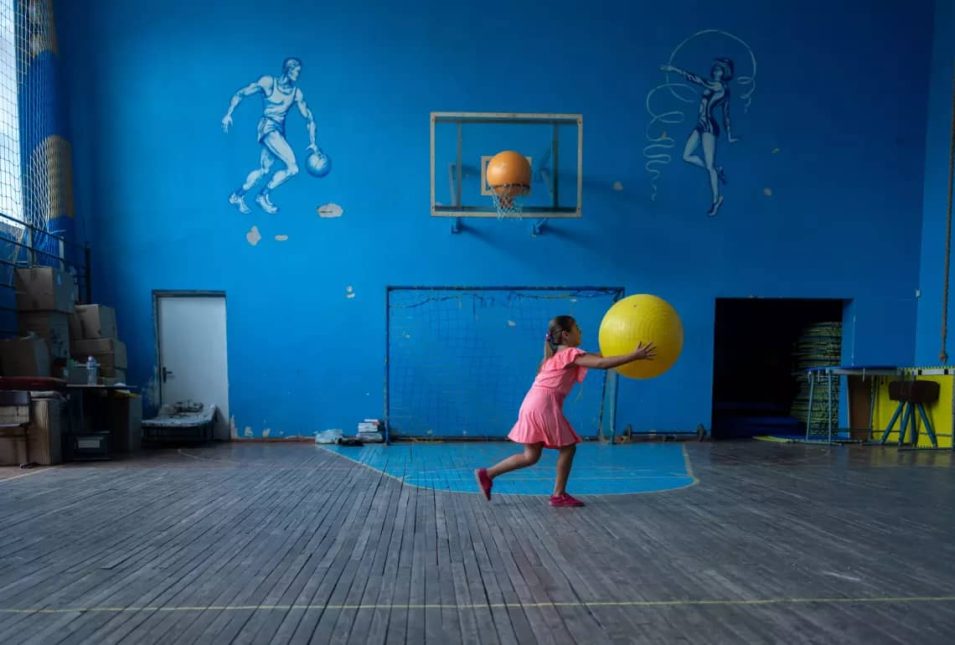
Since January, the school has been using its basement cafeteria as a simple bomb shelter, in which 100 students can sit at their desks simultaneously.
But now, construction workers are building an underground school, which will accommodate up to 500 children from the district and provide them with a permanent in-person learning programme. This will enable Alyona and her friends to attend school regularly.
“It’s such a joy that we are building an underground school. It will increase our in-person capacity to 200 students. With two shifts, we could even host students from other educational institutions in our community.”
Larysa Sutkova, Director of the Petropil Lyceum
To ensure a safe learning environment for children, the United Nations Children’s Fund (UNICEF) has developed detailed project specifications and design plans for new shelters in kindergartens and schools across Ukraine. Currently, five of these ‘underground schools’ are being built in the Zaporizka region. Once completed, they will provide shelter for 3,000 students, allowing them to continue their education uninterrupted during air raids.
© UNICEF
“The children need these lessons and support”
Catch-up lessons, supported by UNICEF, have been running in schools across the Zaporizka region since last autumn. Children from third to tenth grade can attend maths and Ukrainian language classes twice a week to make up for lost learning.
“The children really lost a lot of knowledge during online learning, especially during air raids,” says Larysa, who attends school everyday to organize classes and oversee construction. “Some have access to a shelter at home, some don’t. It’s the same with the internet. Of course, the children need these lessons and support.”
Alyona is among the students taking these catch-up lessons.
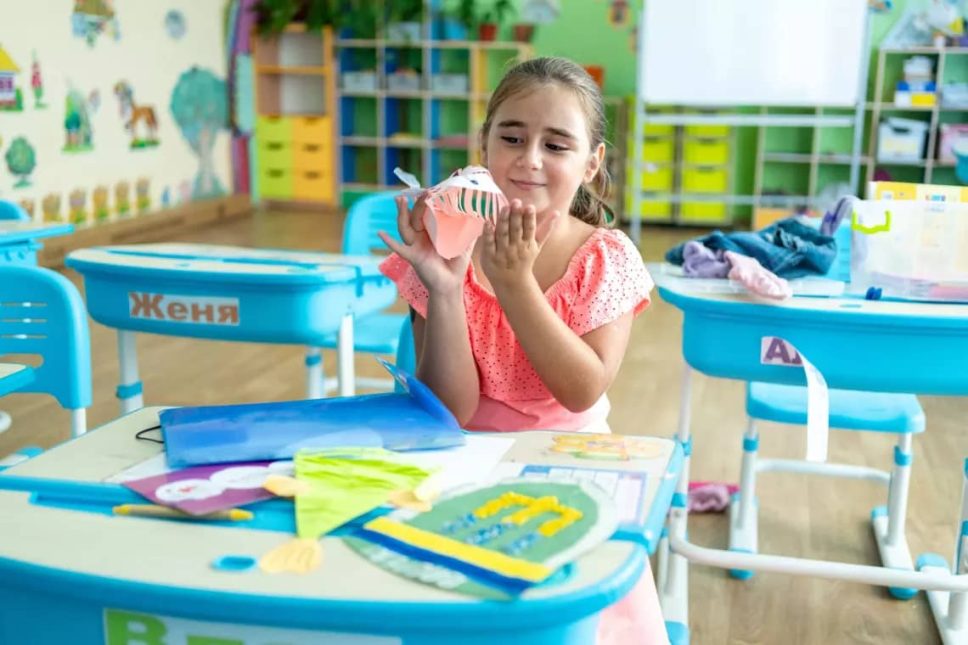
“Maths is easy for me. I enjoy solving tasks. But it’s hard to learn maths online because of the frequent power outages. Sometimes you can’t hear or see the teacher. Here, I can raise my hand, and the teacher will come and help me. Here, I can solidify my knowledge.”
In this frontline region, children have few opportunities for summer recreation, so school becomes a vital place for them to socialise and connect, even during the holidays.
“I would really like to go to the water park in Zaporizhzhia, but I’m scared because there might be shelling,” says Alyona. “So I stay home all summer. I help my mother with the cows. Every morning, I take six litres of milk to the neighbours on my bike, and then I come here.”
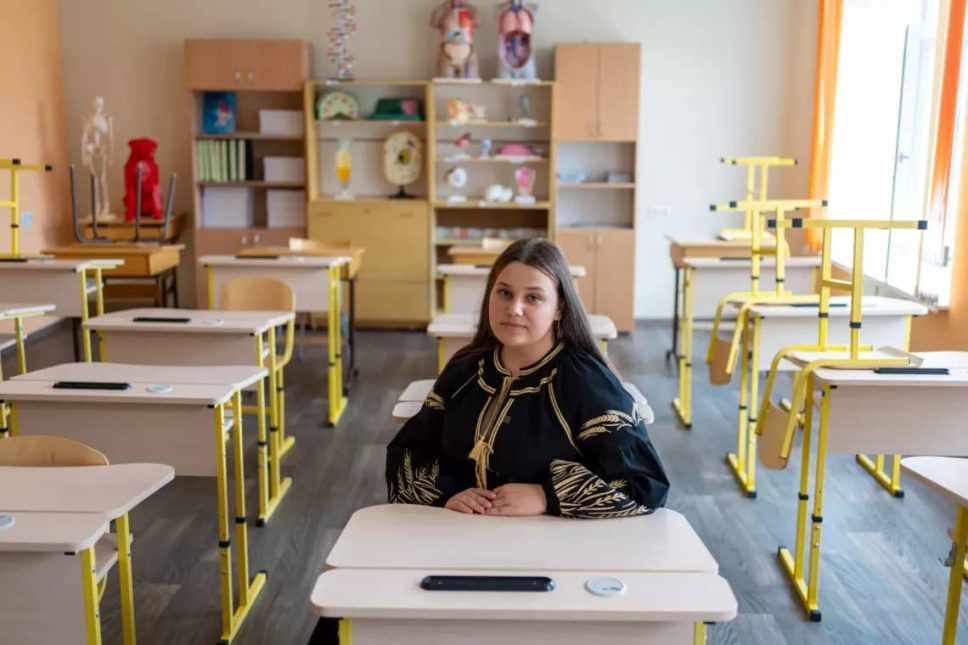
“I want to go to school all the time”
Fifteen-year-old Veronika and her family moved from the Donetska region when her hometown became a frontline area. Over the two years of the full-scale war, Veronika has experienced both online and blended learning formats.
“About ten students wouldn’t log in each time,” she says of her online schooling. “Sometimes, even teachers couldn’t make it online because of the shelling and connection issues”.
”It’s very difficult to study online as there’s no live communication, no fun, no jokes. Then, when we switched to blended learning, I was even scared to go to the blackboard for the first time because I had forgotten what it felt like.”
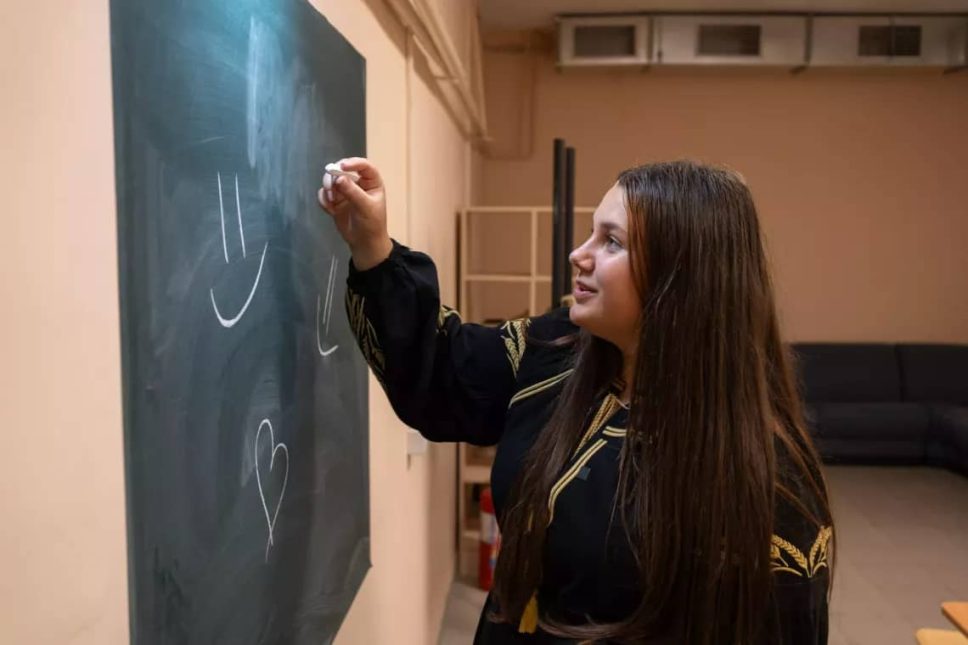
Like Alyona, Veronika was thrilled to meet and make friends with classmates she had only previously seen on a screen. But she still misses regular school.
“You have fun for a week, then you stay at home for a whole week, don’t see anyone and the anxiety comes back. My eyesight also worsened a lot from studying online. It improved a bit when I got the laptop, but it’s still hard.”
Veronika (15)
Veronika has received a laptop as part of UNICEF’s programme in cooperation with the Ministry of Education and Science of Ukraine.
All of the children are now looking forward to the new school year.
“I want to go to school all the time in the new year,” says Alyona. “Because if you miss even one day, it could be the day when something interesting and funny happens.”
“We’re preparing for the first of September,” adds Larysa. “It’s the biggest holiday for us, so we’re getting the school ready, preparing the curriculum, and ensuring that the children can study happily and safely in the new year.”
© UNICEF
In 2023, UNICEF helped nearly 1.5 million of Ukraine’s most vulnerable children gain access to both formal and non-formal education. This year, over 500,000 children have already received similar support.
To address the learning gaps caused by the ongoing war, UNICEF and its partners, with funding from the European Union (EU), the Global Partnership for Education (GPE), and the governments of Luxembourg, Germany, Japan and Norway, have provided classes for more than 35,000 school children.
To ensure that every child continues to receive an education, UNICEF is also setting up shelters in kindergartens and schools, and providing laptops, tablets and teaching materials to both teachers and students.
Thanks to funding from the EU, UNICEF has already rehabilitated shelters in 143 schools and kindergartens, creating a safer environment for more than 45,000 children across Ukraine. Additionally, 26 more shelters are being rebuilt with support from the EU and the governments of Norway and France.
In areas where face-to-face education is not possible due to proximity to the frontline or a lack of shelters, UNICEF has distributed more than 87,000 laptops and tablets. This initiative is funded by the EU and the Governments of the Republic of Korea and Japan, with support from the GPE, UNICEF National Committees and the Breakthrough Prize Foundation’s Technology for Refugees initiative.
Stories
-
Katarina Mathernova: If Ukraine had a human face and a human spirit, it would be 10-year-old Roman Oleksiv
-
A regional mission to drive social entrepreneurship: the story of Ksenia Kosukha
-
EU restores safe water supply for 100,000 Ukrainians affected by war
-
Promoting IT during the war: Lviv IT cluster and how EU4Digital helps
-
Frontline digitalisation: Kharkiv IT Cluster collaborations
-
How EU4Youth is driving opportunity and success among young Ukrainians
